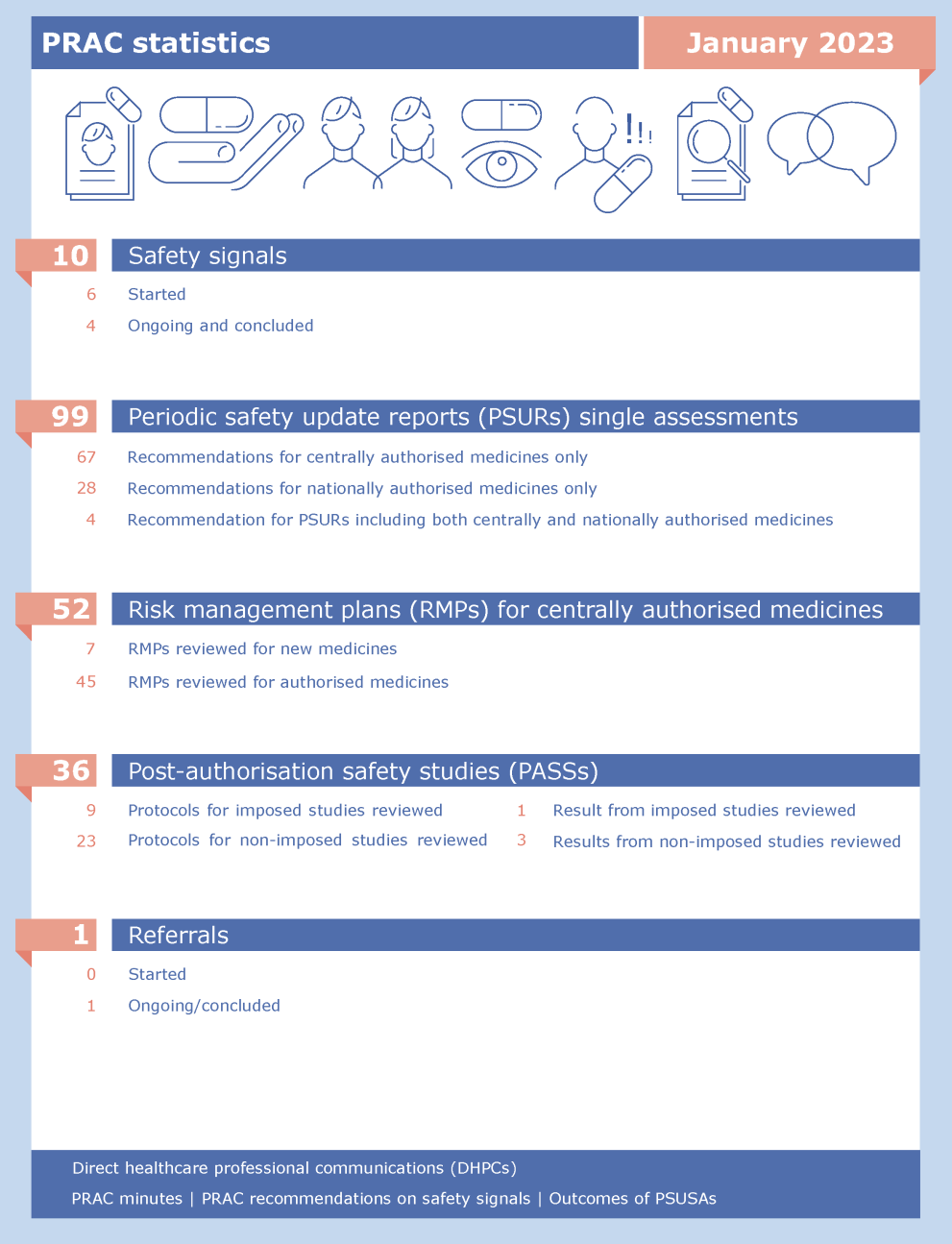Alignment of dose recommendations for Janus kinase (JAK) inhibitors in patients with certain risk factors
EMA’s safety committee, PRAC has further reviewed measures to minimise the risk of serious side effects associated with Janus kinase (JAK) inhibitors used to treat several chronic inflammatory disorders. The PRAC has recommended the use of a lower dose of Olumiant (baricitinib) for patients at higher risk of blood clots, cardiovascular conditions and cancer in line with the dosing recommendations for other JAK inhibitors subject to the review: Rinvoq (updacitinib), Cibinqo (abrocitinib) and Jyseleca (filgotinib).
More information is available in EMA’s public health communication.
New safety information for healthcare professionals
As part of its advice on safety-related aspects to other EMA committees, the PRAC discussed a direct healthcare professional communication (DHPC) containing important information on Zolgensma.
Zolgensma: fatal cases of acute liver failure
Fatal cases of acute liver failure were recently reported in patients treated with Zolgensma (onasemnogene abeparvovec), a gene therapy medicine for the treatment of spinal muscular atrophy (SMA), a serious rare condition of the nerves that causes muscle wasting and weakness. This DHPC informs healthcare professionals of the fatal cases of liver failure and the updated recommendations for monitoring liver function, assessing suspected liver injury after infusion and further advice regarding tapering the corticosteroid treatment. Healthcare professionals should promptly assess patients with worsening liver function tests and/or signs or symptoms of acute liver illness. If patients do not respond adequately to treatment with corticosteroids, treating physicians should consult a paediatric gastroenterologist or hepatologist and consider adjustment of the corticosteroid regimen.
The DHPC for Zolgensma will be forwarded to EMA’s committee for advanced therapies (CAT) and to EMA’s human medicines committee (CHMP). When adopted, the DHPC will be disseminated to healthcare professionals by the marketing authorisation holders, according to an agreed communication plan, and published on the ‘Direct healthcare professional communications’ page and in national registers in European Union (EU) Member States.
Agenda
PRAC statistics: January 2023

Glossary:
- Safety signal assessments. A safety signal is information which suggests a new potentially causal association, or a new aspect of a known association between a medicine and an adverse event that warrants further investigation. Safety signals are generated from several sources such as spontaneous reports, clinical studies and the scientific literature. More information can be found under 'Signal management'.
- Periodic safety update reports, abbreviated as PSURs, are reports prepared by the marketing authorisation holder to describe the worldwide safety experience with a medicine in a defined period after its authorisation. PSURs for medicinal products that contain the same active substance or the same combination of active substances but have different marketing authorisations and are authorised in different EU Member States, are jointly assessed in a single assessment procedure. More information can be found under 'Periodic safety update reports: questions and answers'.
- Risk management plans, abbreviated as RMPs, are detailed descriptions of the activities and interventions designed to identify, characterise, prevent or minimise risks relating to medicines. Companies are required to submit an RMP to EMA when applying for a marketing authorisation. RMPs are continually updated throughout the lifetime of the medicine as new information becomes available. More information is available under 'Risk-management plans'.
- Post-authorisation safety studies, abbreviated as PASSs, are studies carried out after a medicine has been authorised to obtain further information on its safety, or to measure the effectiveness of risk-management measures. The PRAC assesses the protocols (aspects related to the organisation of a study) and the results of PASSs. More information can be found under 'Post-authorisation safety studies'.
- Referrals are procedures used to resolve issues such as concerns over the safety or benefit-risk balance of a medicine or a class of medicines. In a referral related to safety of medicines, the PRAC is requested by a Member State or the European Commission to conduct a scientific assessment of a particular medicine or class of medicines on behalf of the EU. More information can be found under referral procedures.
- Summary safety reports have been introduced as part of the enhanced safety monitoring of COVID-19 vaccines. Marketing authorisation holders are required to submit these reports to EMA, starting on a monthly basis. Their submission complements the submission of PSURs. For more information see Pharmacovigilance plan of the EU Regulatory Network for COVID-19 vaccines.
Ongoing referrals
Procedure | Status | Update |
|---|---|---|
| Topiramate – Article-31 referral | Under evaluation | PRAC continued its assessment |